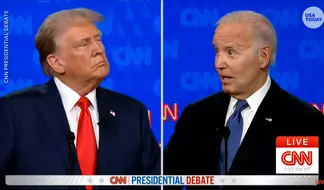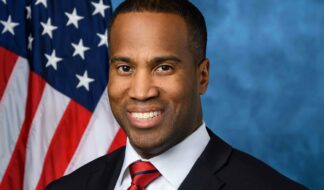By Chris Crain
{ITAL A week after a hate crimes bill was renamed
for Matthew Shepard, the killings of other college
students at Va. Tech were exploited to oppose it.}
Like most national tragedies, the shooting massacre at Virginia Tech has found its way into the public debate on a number of hot-button social issues. Within hours, both sides of the battle over gun control had cited the events in Blacksburg to support their positions.
And, like 9/11 before it, the Virginia Tech slaughter is being exploited by those who oppose gay rights. We all remember Jerry Falwell proclaiming that the gays and feminists brought on the terrorist attacks of 2001 by angering God.
Likewise last week, the hateful Phelps clan from the Westboro Baptist Church in Kansas announced plans to picket the funerals of Virginia Tech victims for similar reasons.
The shootings were further evidence that America has condemned itself to destruction by accepting homosexuality and other "sins of the flesh," according to Shirley Phelps-Roper, daughter of the good Rev. Fred.
"The evidence is [those killed] were not Christian. God does not do that to his servants," she told the Associated Press. "You don't need to look any further for evidence those people are in hell."
But it wasn't just the anti-gay fringe to seize the moment. A psychologist interviewed by Anderson Cooper (of all people) speculated on CNN that shooter Cho Seung Hui was lashing out against women due to discomfort with his own "latent homosexuality."
And finally there was the Christian News Wire, buzzing with a press release by the Biblical Family Advocates, arguing that the campus shooting illustrated the "absurdity" of hate crimes legislation.
Of all the reactions, this was the most timely. Just two weeks earlier, Sens. Ted Kennedy (D-Mass.) and Gordon Smith (R-Ore.) reintroduced a bill that would allow federal prosecution of hate crimes, including those based on sexual orientation and gender identity. Similar legislation had been introduced in the House two weeks earlier, and has passed one or the other houses of Congress numerous times over the years, but never made it to the president's desk.
This year, the bill has renamed to honor Matthew Shepard, another college student struck down violently just as he began his adult life. But to hear the conservatives tell it, all violent crime is motivated by "hate," so punishing some more than others is "hypocritical."
"How can anyone say that it was not a hate crime for any of these [Virginia Tech] students or faculty to die the way they did?" asked Phil Magnan, director of Biblical Family Associates. "Where is their equal protection of the law? The fact remains that all crimes are a crime of hate."
In fact, most violent crime among strangers is motivated by greed and indifference, not outright hate for the victims, but Magnan's analysis isn't only wrong there. Our laws regularly punish crimes differently based upon the intent of the perpetrator and the societal impact of the offense.
The U.S. federal sentencing guidelines, for example, allow for a more severe punishment if the criminal singled out the victim based on his or her old age or other frailty. The victim's vulnerability makes the crime particularly heinous.
Civil rights laws similarly punish burning a cross in the lawn of an African-American family much more severely than burning some other object in the lawn of a family without regard to their race because the impact of the crime is much more severe. It's intended to intimidate not just the black residents of that house but others in the area.
The same is true of hate crimes where the victims are selected based on their sexual orientation or gender identity. Two years ago this weekend, during gay-friendly Amsterdam's annual Queen's Day festivities, my partner and I were walking hand in hand down a busy street.
A group of thugs spat on us and muttered an anti-gay obscenity, and when we didn't flee, they attacked us, leaving me with a broken nose and two black eyes. No doubt there were other street scuffles during the course of that weekend, some perhaps resulting in more serious injuries. But the attack on us was intended to terrorize us, and others like us, from exercising the basic human freedom of walking down the street holding hands.
Consider for a moment if Cho Seung Hui, the Virginia Tech shooter, had been Muslim, and his videotape message had said his attack was part of an anti-American jihad. The crime would no doubt taken on even greater significance, probably resulting in all sorts of anti-terror measures.
The motivation of the criminal matters, even if he's acting on a hostility against gays that is a perversion of Christianity, in the same way terror attacks can be a perversion of Islam. Gordon Smith was right when he dismissed concerns that the Matthew Shepard Act would infringe on the free speech rights of those opposed to homosexuality on religious grounds.
"This act is about the prosecution of crime, not prohibition of speech," Smith told the Washington Post. "Unless they believe part of their religion is the practice of violence against others, they should not be affected by this bill."









